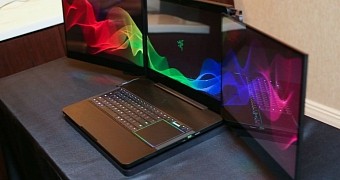Razer’s CEO has just revealed in a post on Facebook that thieves managed to break into the company’s booth at CES in Las Vegas and steal two prototypes that were presented at the show.
Min-Liang Tan explains in his message that it’s possible the theft is actually an attempt of cyber espionage, mostly as a result of the firm innovating with new devices that caught the attention of both customers and competition.
Razer officials are already working with CES representatives and law enforcement in this case, but the company’s CEO calls for whoever can help the investigation to send information at [email protected].
“We have filed the necessary reports and are currently working with the show management as well as law enforcement to address this issue. At Razer, we play hard and we play fair. Our teams worked months on end to conceptualize and develop these units and we pride ourselves in pushing the envelope to deliver the latest and greatest,” Razer’s CEO explained.
“We treat theft/larceny, and if relevant to this case, industrial espionage, very seriously - it is cheating, and cheating doesn’t sit well with us. Penalties for such crimes are grievous and anyone who would do this clearly isn’t very smart.”
Prototypes also stolen in 2011
Razer hasn’t revealed the stolen prototypes, but the company did present several innovative ideas at this year’s CES, including the so-called Project Valerie laptop. The device features three different displays, each with a 4K resolution, and state-of-the-art specs that make it one of the most powerful laptops at this point.
Still in prototype phase, Project Valerie was supposed to hint at more revolutionary devices coming from Razer possibly as early as this year.
Oddly enough, this is not the first time when thieves steal Razer prototypes. Back in November 2011, two prototypes of the Razer Blaze high-end gaming laptop were stolen from its Bay Area R&D lab.
At that point, however, the company said nothing about industrial espionage, but it recommended customers to avoid buying prototypes online and report any listing to the authorities.

 14 DAY TRIAL //
14 DAY TRIAL //